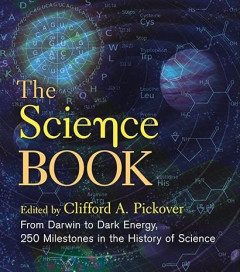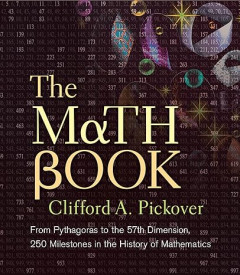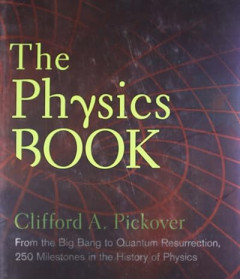Ditapis dengan

E-book The Science Book: From Darwin to Dark Energy, 250 Milestones in the Hi…
From astronomy to psychology, this beautifully illustrated chronology presents the most important and groundbreaking milestones in science. Award-winning author Cliff Pickover (The Math Book, The Physics Book, and The Medical Book) gathers into one fully illustrated volume the most important thinkers and ideas in the history of science. This unique omnibus edition includes 250 thoughtfu…
- Edisi
- -
- ISBN/ISSN
- 9781454933007
- Deskripsi Fisik
- 779 halaman, ilus.
- Judul Seri
- -
- No. Panggil
- 500.0 PIC t
E-book The Medical Book: From Witch Doctors to Robot Surgeons, 250 Milestones…
Following his hugely successful The Math Book and The Physics Book, Clifford Pickover now chronicles the advancement of medicine in 250 entertaining, illustrated landmark events. Touching on such diverse subspecialties as genetics, pharmacology, neurology, sexology, and immunology, Pickover intersperses “obvious” historical milestones--the Hippocratic Oath, general anesthesia, the Human Gen…
- Edisi
- -
- ISBN/ISSN
- 9781402792335
- Deskripsi Fisik
- 567 halaman
- Judul Seri
- -
- No. Panggil
- 610.9 PIC t

E-book The Math Book: From Pythagoras to the 57th Dimension, 250 Milestones i…
Beginning millions of years ago with ancient “ant odometers” and moving through time to our modern-day quest for new dimensions, The Math Book covers 250 milestones in mathematical history. Among the numerous delights readers will learn about as they dip into this inviting anthology: cicada-generated prime numbers, magic squares from centuries ago, the discovery of pi and calculus, and the …
- Edisi
- -
- ISBN/ISSN
- 9781402757969
- Deskripsi Fisik
- 534 halaman
- Judul Seri
- -
- No. Panggil
- 510 PIC t

E-book The Physics Book: From the Big Bang to Quantum Resurrection, 250 Miles…
Following the hugely successful The Science Book and The Math Book comes a richly illustrated chronology of physics, containing 250 short, entertaining, and thought-provoking entries. In addition to exploring such engaging topics as dark energy, parallel universes, the Doppler effect, the God particle, and Maxwells demon, the books timeline extends back billions of years to the hypothetical Big…
- Edisi
- -
- ISBN/ISSN
- 9781402790997
- Deskripsi Fisik
- 606 halaman, ilus.
- Judul Seri
- -
- No. Panggil
- 530 PIC t
E-book Human Rights in Child Protection : Implications for Professional Pract…
Professional practice is a defining trait of modernity, and democratic and constitutional nation-states depend on professional practitioners and their efforts to solve problems and coordinate activity in order to distribute state services as accurately as possible, thus dealing with the particular problem at hand of implementing human rights. Throughout modern history, legis-lators in different…
- Edisi
- -
- ISBN/ISSN
- 9783319948003
- Deskripsi Fisik
- 269 hlm
- Judul Seri
- -
- No. Panggil
- 364 CHR h
E-book A Companion to The Roman Empire
Fifteen years ago, historians of the Roman world were in the process of dismantling the hierarchical structure of their subject that had endured since the beginning of scholarly discourse about the Roman Empire. In the late sixties and early seventies, scholars began to move away from work concentrating on the dominant social and political group that had produced the bulk of the surviving liter…
- Edisi
- -
- ISBN/ISSN
- 9780631226444
- Deskripsi Fisik
- 715 hlm
- Judul Seri
- -
- No. Panggil
- 937 POT a

TAFSIR KEBUDAYAAN
- Edisi
- cet. 1
- ISBN/ISSN
- 979-413-746-4
- Deskripsi Fisik
- XII; 282 hlm; ind;15 x 23 cm
- Judul Seri
- -
- No. Panggil
- 301.2 GEE t
- Edisi
- cet. 1
- ISBN/ISSN
- 979-413-746-4
- Deskripsi Fisik
- XII; 282 hlm; ind;15 x 23 cm
- Judul Seri
- -
- No. Panggil
- 301.2 GEE t
 Karya Umum
Karya Umum  Filsafat
Filsafat  Agama
Agama  Ilmu-ilmu Sosial
Ilmu-ilmu Sosial  Bahasa
Bahasa  Ilmu-ilmu Murni
Ilmu-ilmu Murni  Ilmu-ilmu Terapan
Ilmu-ilmu Terapan  Kesenian, Hiburan, dan Olahraga
Kesenian, Hiburan, dan Olahraga  Kesusastraan
Kesusastraan  Geografi dan Sejarah
Geografi dan Sejarah